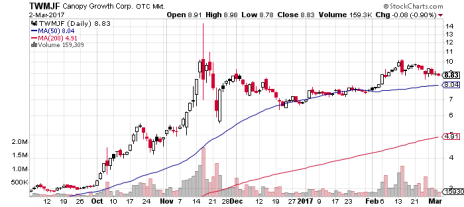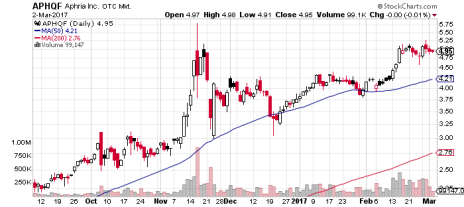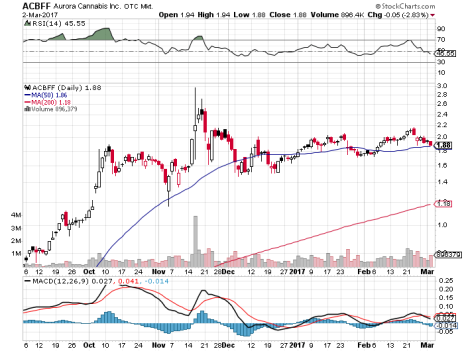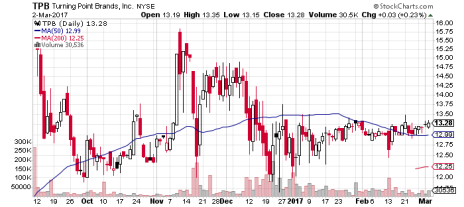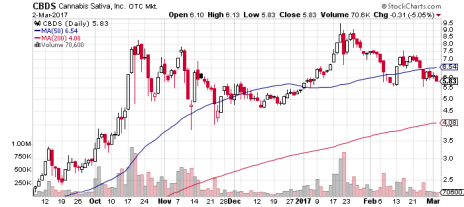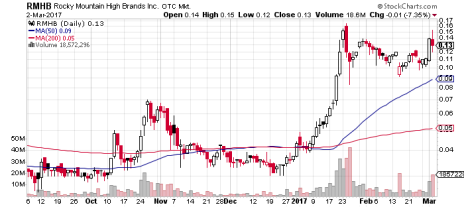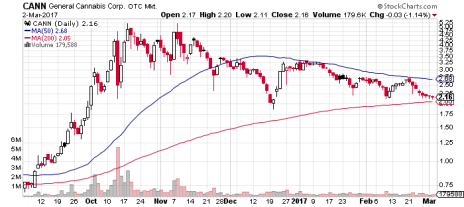Back on January 9, I surveyed the entire landscape of marijuana stocks, and gave you a brief analysis of all 15 of them, even the most low-priced. (Nine were trading under a dollar at the time.)
I concluded by telling you that while many of these marijuana stocks were worth watching, the high prices at the time (after the post-election bounce) meant it was wiser to wait for prices to cool off.
In today’s update, I’m not covering all 15 again; many just aren’t worth the risk. After discarding those that are too low-priced, too thinly traded, or just plain stuck in downtrends—I’m left with seven marijuana stocks that might be your ticket to riches in this fast-growing industry.
Still, there’s substantial risk in the sector, not only because the rules in the U.S. (Federal, State and local) are guaranteed to change, but also because the industry is so small at the moment that demand for stock exceeds quality supply, with the result that values are elevated.
[text_ad use_post='137724']
In the meantime, the Canadian marijuana industry is well ahead of the U.S.—and learning lessons that U.S. operators will be quick to take advantage of when their time comes.
So here are my profiles of the seven best marijuana stocks. I begin with the company that has the highest market capitalization—meaning investors in general perceive it as the best investment—and work my way down the list from there.
Marijuana Stock #1: Canopy Growth (TWMJF)
Canopy Growth was the first marijuana company to go public and it remains in the forefront of the industry, not least because its financial strength has enabled strategic acquisitions. Located in Smiths Falls, Ontario, Canopy has more than half a million square feet of indoor growing space, and sells three brands of product.
Tweed, its original brand, is the most recognized marijuana production brand in the world. Bedrocan, based on strains developed in Holland over decades, is the epitome of medical grade marijuana. And Mettrum, with a unique color-based strength and dosage system, is the leading natural health brand in the Canadian medical cannabis market.
In the company’s fiscal third quarter, ended December 31, revenues grew 180% from the year before to $7.3 million (U.S.), while earnings per share were two cents, up from a loss of three cents. In the previous nine-month period, the company sold approximately 3,400 kilos and kilogram equivalents at an average price of $7.12 (Canadian) per gram compared to just under a thousand kilograms at an average price of $7.49.
On the conference call that followed the Q3 report, CEO Bruce Linton summed up the situation with the comment, “Essentially there are more people becoming patients than there are necessarily capable suppliers.”
TWMJF hit resistance at 10 in both November (post-election) and February and is setting up to eventually break out into true double-digits, where institutional investors will start to take notice.
The company’s market capitalization is $1.4 billion.
Marijuana Stock #2: Aphria (APHQF)
The #2 grower in Canada is Aphria, which is headquartered in Learnington, Ontario and markets both marijuana and cannabis oil under the Pure Natures Wellness brand. The company expects to increase its greenhouse space from 100,000 square feet to 300,000 square feet this year.
In the quarter ended November 30, revenues were $5.2 million, up 158% from the year before, and the company earned a penny per share, unchanged from the year before.
APHQF topped 5 after the election, bottomed at 3 soon after, and returned to the 5-level in February. It’s now setting up to break out to new highs.
The company’s market capitalization is about $610 million.
Marijuana Stock #3: Aurora Cannabis (ACBFF)
Aurora is the only Canadian producer of medical marijuana located in Alberta; it boasts that its plants are raised on fresh Rocky Mountain water. The rural operation means Aurora may be the lowest-cost producer in Canada, which might eventually translate into higher margins.
In the company’s fiscal second quarter, ended December 31, revenues were $3.9 million, up from nothing the year before, and the net loss was $2.7 million.
Aurora is building an 800,000-square-foot production facility (located at the Edmonton International Airport) designed to produce approximately 100,000 kilograms of marijuana per year.
Also, the firm has launched the industry’s first mobile app, to enable ordering by smartphone. To date, the app has been downloaded by 23,000 individuals, and cut in half orders by traditional phone.
ACBFF hit resistance at 3 post-U.S. election, bottomed at 1.6, and has been trending slowly higher since, pulling its 50-day moving average behind. But the fact that it hasn’t returned to its post-election high means it’s not as strong as the first two stocks.
The company’s market capitalization is about $520 million.
Note: The remaining four companies are based in the U.S., where it’s a federal crime to sell marijuana—so they don’t. What they do instead is interesting, but it’s probably nowhere near as profitable as selling marijuana, and it’s way too early to know who will lead that industry in the U.S. when the time comes—though it would be foolish to underestimate the Big Tobacco—Philip Morris (PM), Altria Group (MO), British American Tobacco (BTI) and Reynolds American (RAI).
Marijuana Stock #4: Turning Point Brands (TPB)
Based in Louisville, Kentucky, Turning Point is mainly a tobacco company, selling Red Cap pipe tobacco, Stoker’s snuff and chewing tobacco and Beech-Nut, Trophy, Havana Blossom and Durango chewing tobacco.
But those businesses are mature, and not really growing, so Turning Point is looking to capitalize on the marijuana industry with its ownership of the Zig-Zag brand, which includes not only cigarette papers and cigar wraps, but also Zig-Zag branded Vaporizers. Turning Point also owns the VaporBeast vaporizer brand and has exclusive distribution rights to the V2 brand.
In the third quarter of 2016, revenues were $51.0 million, down 1% from the year before. Earnings per share were $0.24, down 8%. Fourth quarter results are due Monday, March 13.
TPB surged to top 15 post-election, bottomed at 12, and has recently crept above 13 in what is a moderately positive pattern.
The company’s market capitalization is about $240 million.
Marijuana Stock #5: Cannabis Sativa (CBDS)
Based in Mesquite, Nevada, Cannabis Sativa is notable for the fact that its CEO is Mike Gravel, who represented Alaska in the U.S. Senate from 1969 to 1981. Also on the Board of Directors are Stephen Downing, who served as a member of the LA Police Department for 20 years, and Judge Jim Gray, who currently presides over the civil trial calendar for the Superior Court of Orange County.
CBDS is unusual among these companies in that its chart hit a new high in January. The reason: an article in the Los Angeles Times discussing the company’s success at getting a patent on a strain of marijuana developed in Ecuador.
The fact that marijuana is still illegal under Federal law means companies cannot trademark cannabis products, but the company’s successful end run reveals some clever legal minds—though whether that will translate to revenues and earnings remains to be seen.
Cannabis Sativa’s market capitalization is about $113 million.
Marijuana Stock #6: Rocky Mountain High Brands (RMHB)
Based in Dallas, Texas, this company develops, markets and distributes food and beverage products that are infused with hemp and CBD (Cannabidiol).
The stock hit new highs in January as the company achieved new distribution agreements, and then pulled back calmly into February.
Then last week, the stock popped up again on the news that the company founder had sold his controlling stake to a group that plans to merge the company with Rocky Mountain High China (a previously unaffiliated company), and introduce a new hemp-infused ginseng plum drink into the Asian market.
Rocky Mountain High’s market capitalization is about $100 million.
Marijuana Stock #7: General Cannabis (CANN)
Based in Denver, General Cannabis aims to be an all-in-one resource for the marijuana-growing industry, with divisions in real estate, consulting, security, financing and distribution.
The company’s market capitalization is about $35 million.
The stock touched 5 in October and November, and is now working on building a double bottom at 2. Also, it remains above its uptrending 200-day moving average.
Which Marijuana Stock Would I Buy?
None of these marijuana stocks have been recommended by any of the Cabot analysts (all of whom use proven stock-picking systems), so I wouldn’t buy any of them—yet.
The one stock priced above $10 (Turning Point Brands) has no growth, and the ones priced under $10 have a high level of fundamental risk as well as a high level of technical risk. Without institutional support, marijuana stocks can be quite volatile.
So, much as I’m optimistic about the future of the industry, I don’t see an entry point with a reasonable risk/reward here.
What I do recommend, if you’re looking for small companies with the potential to grow manyfold, is to become a regular reader of Tyler Laundon’s Cabot Small-Cap Confidential. Tyler has a knack for digging up undervalued small cap stocks that are on the cusp of great growth, and he has an amazing record! Right now, for example, his recommended portfolio has 10 holdings. Eight of the recommendations are showing profits, and the average profit is 36%.
Tyler’s latest recommendation, released just last week, is a small company whose software revolutionizes office workers’ working environment. It has the potential to be the next Salesforce! If you’re looking for low-priced stocks with real growth potential, it’s definitely worth a look. Click here to learn more.
[author_ad]

